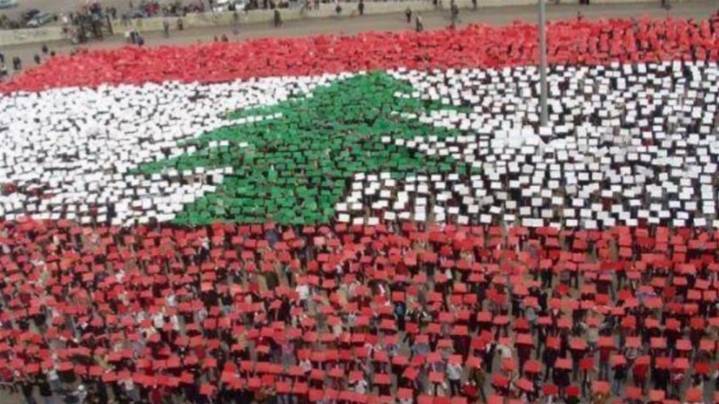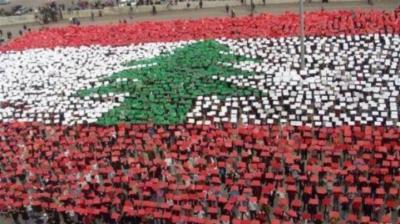An Arabic language teacher stood in front of the students gathered in the schoolyard to celebrate Independence Day, delivering a speech for the occasion, repeatedly opening each sentence with a single refrain: "What meaning does independence hold today while Lebanon suffers?" She then enumerated the difficulties Lebanon was facing... This was in 1987... and today, after 35 years, the sound of that teacher's voice remains stuck in my mind, and the question "What meaning does independence hold today?" is more pressing than ever. What is the meaning of celebrating Independence Day today amid an uncertain presidential vacancy?
Many Independence Day celebrations have passed in Lebanon since that year, accompanied by events, wars, and conflicts between parties and bickering among presidents. However, despite all the divisions, the celebration of Independence Day retained a unifying national symbolism, until Lebanon reached situations it had never experienced even in its darkest days, manifested in recurring presidential and governmental vacancies. Since the emergence of this stage, Independence Day celebrations have been hollow, marked by events not seen in Lebanon's modern history.
The political scene in Lebanon has changed, and with it the spirit of Independence Day celebrations, even if, on the surface, they still abide by their protocol origins. "L'Oncle Tonton" met with Dr. Nabil Shadeed, the Director General of Protocol at the Presidential Palace, to learn about the protocols required for the Independence Day celebration in the context of the presidential vacancy (or perhaps the officials responsible for the protocol hadn’t anticipated that the vacancy in the presidency would become a norm). "A central celebration for Independence Day is not held in the absence of the President of the Republic," Shadeed confirmed, despite the lack of a written rule on the matter. The celebration is organized by the Director General of Protocol at the Presidency and under the auspices of the Presidency, executed by the military command. The celebration is divided into two parts: the first involves placing wreaths on the graves of independence figures, while the second consists of the central military parade, which takes place in the presence of the three presidents.
"Wreath-laying is done in coordination between the General Directorate of Protocol in the Presidency and the Office of the Speakers of the Parliament and the Council of Ministers. There is consultation among the three presidencies to assign ministers and deputies to represent the Lebanese state and lay the wreaths, thus avoiding what happened previously, where three wreaths were sent on behalf of the three presidencies. The unification of wreaths began during President Michel Aoun's term. This year, in the absence of the President of the Republic, the directives of the President of the Council of Ministers will be followed to appoint representatives, but there is no doubt that the protocol and procedures will remain the same."
So, will the names also remain the same as last year to avoid any political or constitutional ambiguity? Or with the change of some parliamentary faces, will some of the names assigned to lay wreaths change? Twenty-five is the number of wreaths placed on the graves of independence figures, but those assigned to represent the Lebanese state in this task are not subject to sectarian distribution, unlike the usual practice in all procedures in Lebanon; instead, they are chosen based on regions and functions. For example, at the statue of Fakhr al-Din, the Minister of Defense will lay the wreath, regardless of his sect.
The second part of the Independence Day celebration is the central ceremony and the military parade. However, in the absence of the President, no central ceremony takes place, and smaller celebrations are held by the military command. The Lebanese state, according to established custom, is represented by the President of the Republic, and in his absence, it is illogical to hold a large central celebration.
"The Independence Day celebration adheres to a specific protocol that is strictly implemented, regardless of the political circumstances or tensions among attendees. Protocol serves as a canopy under which everyone operates," Dr. Shadeed explains, "and all presidents and attendees are familiar with the established protocol rules and do not deviate from them. There is no doubt that political matters have their impact, especially since 1999, but the strength of the protocol lies in the good organization and regulation of everything, as well as finding protocol solutions for potential occurrences such as the absence of figures from the ceremony or the presence of others who might not have a place within the customary protocol hierarchy. Although the protocol does not interfere in politics, it accommodates it while ensuring adherence to the rules."
However, can protocol control gazes, gestures, and facial expressions? Some still remember the look former Prime Minister Hariri shot at President Aoun during the 2021 Independence Day ceremony after failing to form a government following nearly 18 unsuccessful meetings between the two men. The frowning faces and fidgeting in their seats are among the signs that may express much of what is happening politically, but they remain under the umbrella of protocol.
Strict Protocol Procedures
The first to arrive at the celebration after the guests is the Chief of Staff, followed by the Army Commander, then the former presidents, who have their arrival timed to the minute. Following them arrives the Prime Minister and then the Speaker of the House, who are played a special composition along with the national anthem. After that, the President of the Republic arrives to the tune of the honor anthem accompanied by the national anthem. After laying the wreath at the memorial and lighting the flame, the President reviews the participating forces in the parade alongside the Minister of Defense.
On a chair similar to those of the presidents, the President of the Republic sits to preside over the ceremony, with the Speaker of the House to his right and the Prime Minister to his left, while the former presidents and their spouses sit behind him, followed by the ministers, ambassadors, and deputies. And alongside the president, three presidents may stand instead of two if the presence of a caretaker Prime Minister and a designated Prime Minister coincides. This has happened several times, with the last occurrence being the presence of Presidents Hariri and Salam together in 2016. Both stand to the left of the President, but the closest to him is the resigning Prime Minister, who ranks protocol-wise before the designated Prime Minister.
Just like at weddings, similar rehearsals are conducted for Independence Day protocols. The presidents send representatives to perform them and ensure the timing is accurate without any significant modifications, and these representatives walk alongside the presidents on the day of the celebration to ensure adherence to the established protocols. Speaker Berri, who has accompanied four presidencies and three presidential vacancies over thirty years, is most familiar with the procedures... he knows them by heart. Even the protocol-defiant President Lahoud, who refrained from attending the St. Maroun's Day celebration in Gemmayzeh, is obliged to adhere to protocol during Independence Day.
An Embrace that Breaks Protocol
Everyone, as Dr. Shadeed confirms, knows and adheres to the established rules. But occasionally, some charming breaches may occur that the media and social networks amplify, like the time Presidents Aoun, Berri, and Hariri exchanged confections (perhaps as a nod to their "affection").
In an incident that broke protocol in 2017, President Aoun, upon his arrival at the ceremony, embraced President Hariri and kissed him after Hariri returned from Saudi Arabia following his resignation from there and then rescinding it. This was the first meeting between the two after Hariri's tumultuous period. So, it was an extraordinary greeting from Aoun, while protocol dictates that the President must shake hands with the Speakers of the Parliament and the Council of Ministers, and then greet the audience in the back rows.
At the end of the ceremony, the presidents leave as they arrived, each in his convoy, unless they agree to continue the meeting elsewhere, in which case they may leave in one car, as was the case in 2021 when Aoun asked Berri and Mikati to accompany him in his convoy to Babbda, so they took the official presidential car, leading to a meeting in the President's office. However, traditionally, the three presidents head to the presidential palace in their respective convoys to welcome delegations of congratulations, joined by the Foreign Minister when the ambassadors pass through.
Independence Milestones and Presidential Vacancies
Following the presidential vacancy that followed President Michel Sleiman's term, which lasted for two years in 2014 and 2015, Lebanon celebrated Independence Day with a central military parade upon the election of President Michel Aoun. Although the image of the three presidents at the parade generated a wave of optimism at the time, it was a short-lived wave that couldn’t withstand the obstruction that prevented the formation of a government for more than eight months. Political bickering and unfavorable circumstances characterized Aoun’s term, during which the central celebration of Independence Day only took place three times.
Moreover, the previous presidential vacancy after President Lahoud's term did not witness an Independence Day celebration, as President Lahoud's term ended two days after Independence Day in 2007, while President Sleiman was elected in May 2008. The 2019 Independence Day celebration was atypical, as the republic witnessed the popular uprising on October 17 and was suffering from a governmental vacancy following Prime Minister Saad Hariri’s resignation. Thus, it was deemed inappropriate to hold a central celebration, and the commemoration was limited to a symbolic event at the Ministry of Defense amidst a charged political atmosphere and difficulty in forming a government. However, the meager celebration was countered by a large popular event organized by the active factions of the October 17 uprising, where a popular parade took place in downtown Beirut, joined by diverse professional and humanitarian sectors, showcasing a level of popular enthusiasm that recent military parades have lacked.
However, the revolution failed to regain the momentum of this parade during the Independence Day celebrations in 2021, as its mobilization was weak and lacking the popular enthusiasm that had waned. In the 2020 celebration, on the 77th anniversary of independence, the central celebration was absent due to the coronavirus pandemic and the devastation caused by the port explosion, coupled with the worsening financial and political crises in Lebanon. Despite the anniversary coinciding with the centenary of Greater Lebanon, the crisis-stricken Lebanon settled for a small celebration. The same applied for the 78th anniversary as for the third consecutive year; a symbolic military parade was held at the Lebanese Ministry of Defense attended by the three presidents Aoun, Berri, and Mikati, while the ministerial presence was limited to the ministers of defense and interior, and members of parliament and representatives of the diplomatic corps in Lebanon were not invited.




